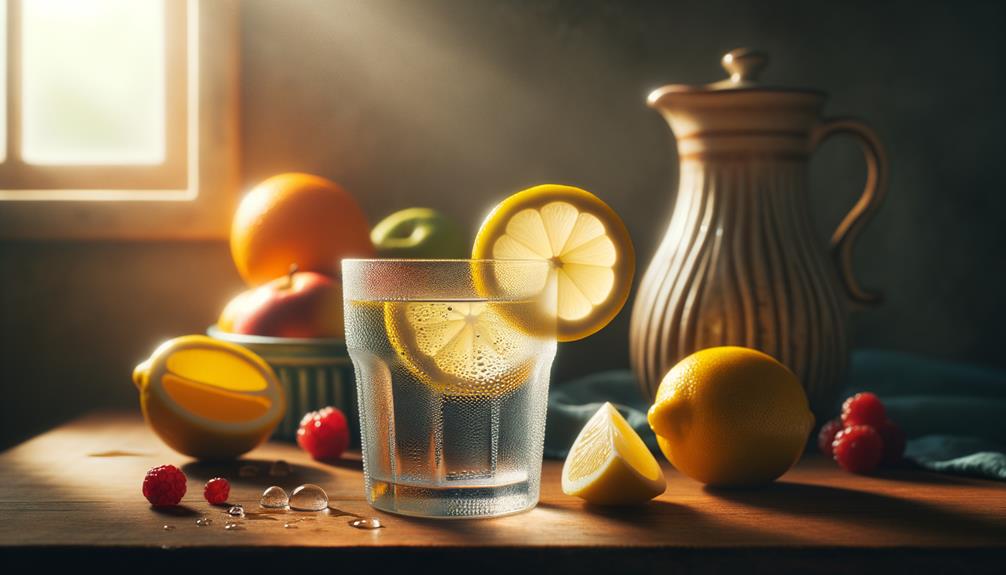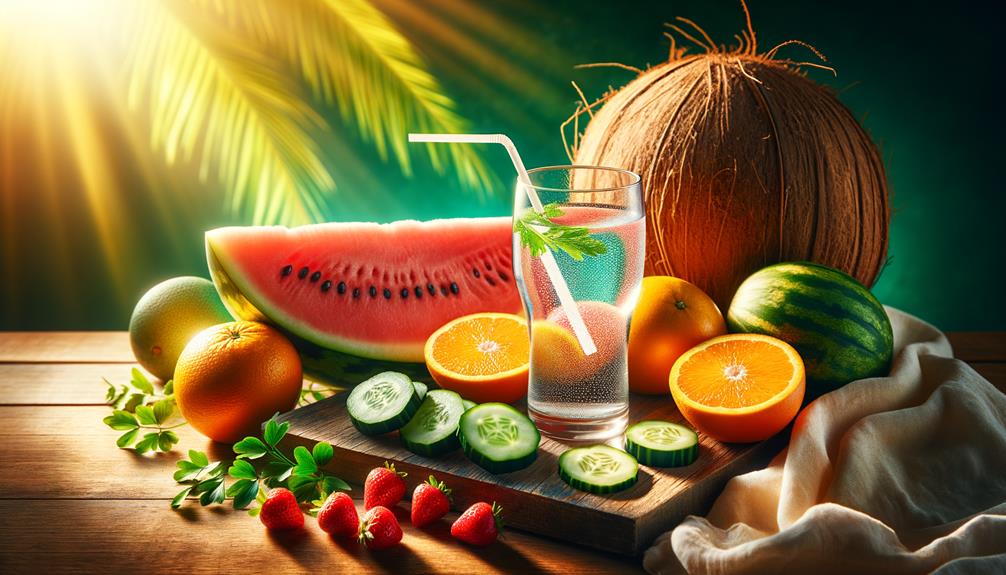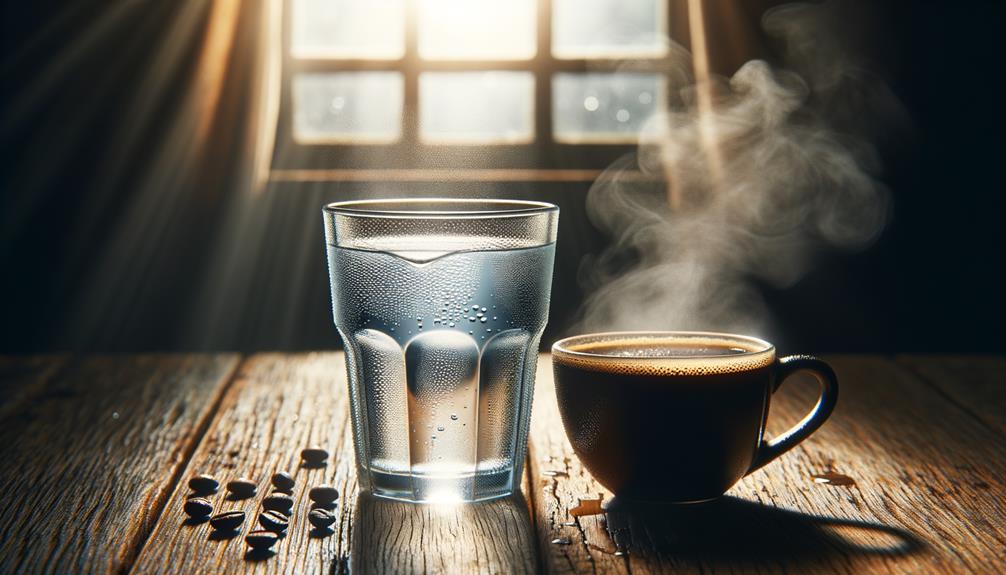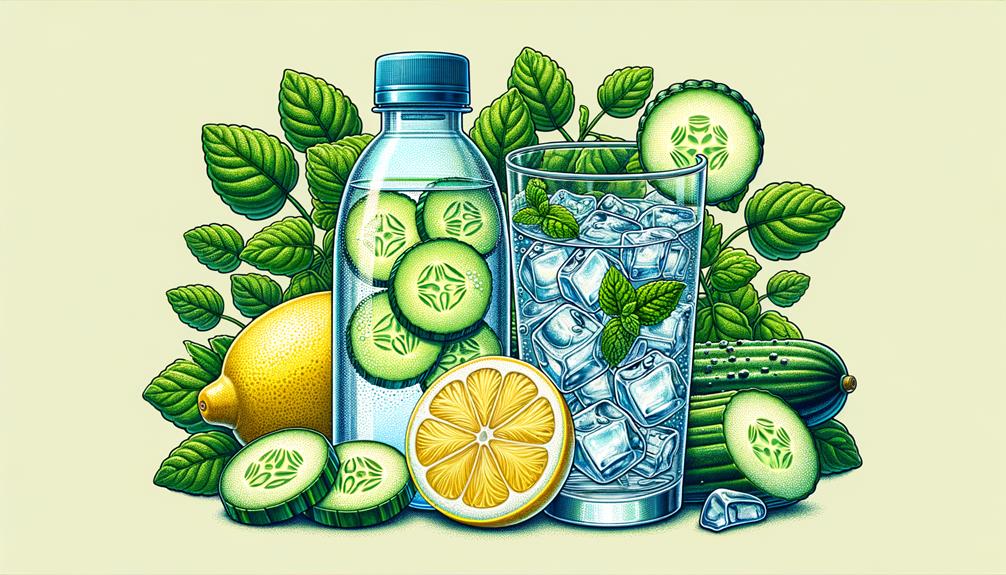Staying hydrated is crucial for me to perform at my best. It helps regulate my body temperature, boosts my mood, and keeps me mentally sharp. I aim to drink 9-13 cups of water daily, but I know that individual needs can vary. I also make sure to eat water-rich foods like fruits and veggies, and I enjoy herbal teas as an added hydration boost. I’m mindful of signs of dehydration, such as dark yellow urine and fatigue, especially after exercise or on hot days. While caffeinated drinks do contribute to my hydration, I consume them in moderation to avoid overdoing it. To stay on track, I carry a reusable water bottle and set reminders for myself.
Key Takeaways
Proper hydration is essential for regulating body temperature, lubricating joints, and keeping organs healthy.
The general daily water intake recommendations are: 13 cups for men, 9 cups for women, 10 cups for pregnant women, and 12 cups for breastfeeding women. For children, it’s recommended to drink 6-8 cups daily.
In addition to plain water, you can also stay hydrated by consuming water-rich fruits, vegetables, dairy products, herbal teas, and moderate amounts of caffeinated beverages.
Dehydration can manifest in various ways, including dark yellow urine, fatigue, and dizziness. To avoid this, make it a habit to drink fluids regularly throughout the day.
A simple way to ensure consistent hydration is to carry a reusable water bottle and set reminders to drink water at regular intervals.
Benefits of Hydration
Staying hydrated is crucial for our bodies to function properly. When we drink enough water, we can regulate our temperature, lubricate our joints, and keep our organs in good shape. But the benefits of hydration go beyond just the basics. Drinking enough water can also boost our mood, improve our cognitive function, and even help with weight loss. Plus, it can improve the quality of our sleep and our physical performance.
To reap these benefits, it’s essential to choose healthy drinks. Water is the best choice, but flavored water with fruits or vegetables and even caffeinated drinks like coffee and tea can contribute to our daily intake. Sugary drinks, on the other hand, can do more harm than good.
Experts like Walter Willett stress the importance of making wise drink choices to avoid excessive sugar consumption. By following these guidelines, we can get the hydration we need without putting our health at risk.
Staying hydrated is about more than just quenching our thirst – it’s about maintaining overall well-being. By prioritizing hydration and making healthy drink choices, we can enjoy the full range of benefits that come with it and support our bodies’ optimal functioning.
Daily Water Intake

Understanding daily water intake is crucial for optimizing our hydration and overall health. The recommended amount varies based on factors like age, weight, and activity level. For men, it’s around 13 cups (3 liters) of fluids per day, while women should aim for about 9 cups (2 liters). Pregnant women need to ensure they drink 10 cups, and breastfeeding women should aim for 12 cups.
Kids and teens also need to prioritize hydration, consuming 6 to 8 cups of water daily. This helps their bodies function efficiently, supporting digestion, circulation, and temperature regulation. Proper hydration also boosts energy levels and enhances performance in daily activities.
Here’s a quick guide to recommended daily water intake:
| Group | Cups of Water | Liters of Water |
|---|---|---|
| Men | 13 | 3 |
| Women | 9 | 2 |
| Pregnant Women | 10 | 2.3 |
| Breastfeeding Women | 12 | 2.8 |
| Children and Teens | 6-8 | 1.4-1.9 |
Hydration Sources

Let’s explore various hydration sources beyond just drinking water. Fruits and vegetables are a great place to start. Water-rich fruits like watermelon and oranges not only quench thirst but also provide essential vitamins. Similarly, vegetables like cucumbers and celery contribute greatly to our hydration levels.
Milk is more than just good for strong bones; it’s also a great way to rehydrate. Dairy products like milk and yogurt have high water content, making them a refreshing choice. If you’re looking for something warm and soothing, herbal teas are a perfect option. They come in various flavors and contain beneficial compounds while boosting your fluid intake.
Fresh fruit and vegetable juices are another excellent source of hydration. Just be mindful of their sugar content. Even caffeinated beverages like coffee and tea can contribute to your daily fluid intake, though it’s important to consume them in moderation due to their diuretic effects.
Incorporating these hydrating foods and drinks into your daily routine ensures you stay refreshed and energized, giving you the freedom to enjoy an active and healthy lifestyle.
Dehydration Risks

When I’m not drinking enough water, I start to feel sluggish and lightheaded. Hot weather, intense exercise, and certain medications can make this worse. To stay healthy, I make sure to drink water regularly and pay attention to my body’s signs of dehydration.
Signs of Dehydration
Recognizing the signs of dehydration is crucial, especially since even mild cases can trigger symptoms like dark yellow urine, dry mouth, and dizziness. Factors that increase the risk of dehydration include hot weather, physical activity, fever, vomiting, and diarrhea, which all accelerate daily water loss.
Monitoring urine color is a simple way to gauge hydration status. Dark urine often signals the need for more fluids. Staying aware of these signs helps ensure adequate hydration. Additionally, age, weight loss, certain medications, and health conditions can further increase the risk of dehydration.
Fatigue, dizziness, and decreased urine output are all symptoms of dehydration that should not be ignored. By paying attention to these warning signs, I can take proactive steps to stay hydrated. Daily water loss occurs through breathing, sweating, and waste elimination, so replacing lost fluids is vital.
Understanding the risks and symptoms of dehydration empowers me to take control of my health, ensuring I stay adequately hydrated and able to enjoy life to the fullest.
Causes of Dehydration
Hot weather, physical activity, and certain health conditions can cause dehydration by accelerating water loss from the body. When we don’t drink enough fluids to replace what’s lost, dehydration sets in, affecting how our bodies function. Symptoms like fatigue, dizziness, and dry mouth can appear quickly, indicating we need to rehydrate.
Dehydration isn’t just caused by weather and exercise. Fever, vomiting, and diarrhea can also deplete our water reserves. Certain medications and health conditions increase the risk, making some people more prone to dehydration. As we age, our bodies become less efficient at conserving water, making it even more important to stay hydrated.
One way to check our hydration level is to look at the color of our urine. If it’s light yellow, we’re okay, but darker urine is a sign we might be dehydrated. We lose water every day through sweating, breathing, and waste elimination, so drinking enough fluids is crucial to counteract this daily loss.
Understanding these causes helps us stay on top of our hydration. It’s not just about drinking water; it’s about recognizing the signs and risk factors that can affect our overall well-being.
Preventing Dehydration
To prevent dehydration, it’s crucial to be mindful of our fluid intake and take steps to stay properly hydrated. Our body constantly loses water through breathing, sweating, and waste elimination, which can lead to dehydration if we’re not careful. Dehydration can affect our body function and cause symptoms like dry mouth and fatigue.
Several factors can increase the risk of dehydration. For instance, hot weather, physical activity, fever, vomiting, and diarrhea require us to drink more water. Additionally, weight loss, certain medications, and age can also impact our hydration needs. One way to monitor hydration is by checking urine color – dark yellow or amber-colored urine usually indicates dehydration, while light yellow or clear urine suggests we’re drinking enough water.
To stay hydrated, it’s a good idea to drink water regularly throughout the day, especially during and after physical activity or exposure to heat. Carrying a reusable water bottle can be a simple and effective way to ensure we always have access to water. By being aware of these factors and taking proactive steps, we can protect our health and enjoy our daily activities without the hindrance of dehydration.
Hydration and Caffeine

When it comes to staying hydrated, caffeinated drinks like coffee and tea can actually help us meet our daily water needs. However, it’s crucial to be mindful of our caffeine intake and keep it around 400 milligrams per day to avoid excessive urination. While a moderate amount of caffeine is okay, relying on energy drinks for hydration isn’t recommended due to their high caffeine and sugar content.
Caffeine’s Hydration Role
Caffeine’s Hydration Role
Although caffeine can increase urination frequency, drinks like coffee and tea still contribute substantially to our daily hydration needs. Caffeinated drinks are often misunderstood when it comes to hydration. With moderate caffeine intake, which is around 400 milligrams per day, these beverages can indeed help keep us hydrated despite the increased urination.
Some key points to consider:
Caffeinated drinks, like coffee and tea, provide hydration and should be included as part of daily fluid intake. Sports drinks are beneficial during intense exercise due to their electrolyte content, helping to maintain hydration levels. Energy drinks, with their high caffeine levels and sugar content, aren’t ideal for hydration and should be consumed sparingly. Sticking to around 400 milligrams of caffeine per day maximizes the benefits of caffeinated drinks without overloading on caffeine.
It’s essential to understand that while caffeine may prompt more bathroom trips, it doesn’t negate the hydrating effects of these beverages. By choosing wisely and keeping caffeine consumption within moderate levels, we can enjoy our favorite drinks without compromising our hydration.
Managing Caffeine Intake
Managing my caffeine intake is crucial to staying hydrated without overloading on stimulants. While caffeinated drinks like coffee and tea contribute to my daily water intake, I need to keep track of how much caffeine I’m consuming. A moderate amount of caffeine, around 400 milligrams per day, is generally safe and helps maintain hydration levels. However, excessive caffeine can lead to frequent urination, which may deplete my body’s water reserves.
When I’m physically active, I opt for sports drinks, which are excellent for maintaining hydration due to their electrolyte content. These drinks help replace lost fluids and minerals during intense exercise. In contrast, energy drinks are not ideal for hydration. They often contain high levels of caffeine and sugar, which can counteract their hydrating benefits.
Tips for Staying Hydrated

To stay well-hydrated, make carrying a reusable water bottle a habit. This simple habit helps you track your daily water intake and meet your hydration goals. Set a drinking schedule to ensure consistent water intake throughout the day, making it easier to stay hydrated without much thought.
Drinking water regularly can prevent mistaking thirst for hunger, which is crucial for weight management. Often, we confuse the two and end up eating when our bodies are actually just thirsty. By staying hydrated, you can better manage your appetite and maintain a healthy weight.
If plain water is too boring, try adding some natural flavors. Infuse your water with fruits like lemon or cucumber for a refreshing twist.
Some practical tips to help you stay hydrated include:
Carry a reusable water bottle to monitor your daily intake.
Add natural flavors like fruits to make water more enjoyable.
Drink water before, during, and after workouts to maintain ideal hydration levels.
Set reminders using apps or alarms to maintain your drinking schedule.
Frequently Asked Questions
Does Drinking Water Increase Hydration?
Drinking water is crucial for our bodies. It plays a vital role in our overall health and keeps me feeling my best. Unlike sugary drinks that can dehydrate me, water helps maintain my energy levels and supports my bodily functions.
How Much Water Should I Drink a Day for Hydration?
I should aim to drink around 13 cups of water daily, but this can vary depending on my activity level and weight. Fresh fruits and veggies also contribute to my hydration. For women, the recommended amount is 9 cups, while pregnant women need 10 cups and breastfeeding women require 12 cups.
Does Water Count as Hydration?
Water is the ultimate hydration source. It’s the purest form and essential for our overall well-being. While other drinks can contribute to our hydration, nothing beats water when it comes to quenching thirst and maintaining our bodies’ optimal function.
What Are the Benefits of Water and Hydration?
Staying hydrated gives me a energy boost, keeps my skin looking its best, and helps my body function smoothly. When I drink enough water and eat foods rich in water, I feel more alert and overall healthier.



